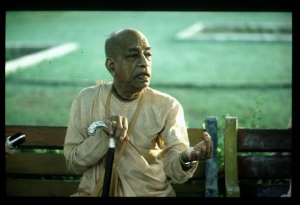SB 7.5.27: Difference between revisions
m (1 revision(s)) |
No edit summary |
||
| Line 1: | Line 1: | ||
{{info | {{info | ||
|speaker= | |speaker=Hiraṇyakaśipu | ||
|listener= | |listener=Ṣaṇḍa | ||
}} | }} | ||
[[Category:Srimad-Bhagavatam - Canto 07 Chapter 05]] | |||
[[Category:Bhagavatam Verses Spoken by Hiranyakasipu - Vanisource|070527]] | |||
<div style="float:left">'''[[Srimad-Bhagavatam]] - [[SB 7|Seventh Canto]] - [[SB 7.5: Prahlada Maharaja, the Saintly Son of Hiranyakasipu|Chapter 5: Prahlāda Mahārāja, the Saintly Son of Hiraṇyakaśipu]]'''</div> | |||
<div style="float:right">[[File:Go-previous.png|link=SB 7.5.26]] '''[[SB 7.5.26]] - [[SB 7.5.28]]''' [[File:Go-next.png|link=SB 7.5.28]]</div> | |||
{{RandomImage}} | |||
==== TEXT 27 ==== | ==== TEXT 27 ==== | ||
<div | <div class="verse"> | ||
santi hy asādhavo loke | :santi hy asādhavo loke | ||
durmaitrāś chadma-veṣiṇaḥ | :durmaitrāś chadma-veṣiṇaḥ | ||
teṣām udety aghaṁ kāle | :teṣām udety aghaṁ kāle | ||
rogaḥ pātakinām iva | :rogaḥ pātakinām iva | ||
</div> | </div> | ||
| Line 17: | Line 22: | ||
==== SYNONYMS ==== | ==== SYNONYMS ==== | ||
<div | <div class="synonyms"> | ||
''santi''—are; ''hi''—indeed; ''asādhavaḥ''—dishonest persons; ''loke''—within this world; ''durmaitrāḥ''—cheating friends; ''chadma-veṣiṇaḥ''—wearing false garbs; ''teṣām''—of all of them; ''udeti''—arises; ''agham''—the reaction of sinful life; ''kāle''—in due course of time; ''rogaḥ''—disease; ''pātakinām''—of sinful men; ''iva''—like. | |||
</div> | </div> | ||
| Line 24: | Line 29: | ||
==== TRANSLATION ==== | ==== TRANSLATION ==== | ||
<div | <div class="translation"> | ||
In due course of time, various types of diseases are manifest in those who are sinful. Similarly, in this world there are many deceptive friends in false garbs, but eventually, because of their false behavior, their actual enmity becomes manifest. | In due course of time, various types of diseases are manifest in those who are sinful. Similarly, in this world there are many deceptive friends in false garbs, but eventually, because of their false behavior, their actual enmity becomes manifest. | ||
</div> | </div> | ||
| Line 31: | Line 36: | ||
==== PURPORT ==== | ==== PURPORT ==== | ||
<div | <div class="purport"> | ||
Being anxious about the education of his boy Prahlāda, Hiraṇyakaśipu was very much dissatisfied. When Prahlāda began teaching about devotional service, Hiraṇyakaśipu immediately regarded the teachers as his enemies in the garb of friends. In this verse the words rogaḥ pātakinām iva refer to disease, which is the most sinful and miserable of the conditions of material life (janma-mṛtyu jarā-vyādhi ([[BG 13.9]])). Disease is the symptom of the body of a sinful person. The smṛti-śāstras say, | Being anxious about the education of his boy Prahlāda, Hiraṇyakaśipu was very much dissatisfied. When Prahlāda began teaching about devotional service, Hiraṇyakaśipu immediately regarded the teachers as his enemies in the garb of friends. In this verse the words ''rogaḥ pātakinām iva'' refer to disease, which is the most sinful and miserable of the conditions of material life (''janma-mṛtyu jarā-vyādhi'' ([[BG 13.8-12 (1972)|BG 13.9]])). Disease is the symptom of the body of a sinful person. The ''smṛti-śāstras'' say, | ||
:brahma-hā kṣaya-rogī syāt | :brahma-hā kṣaya-rogī syāt | ||
:surāpaḥ śyāvadantakaḥ | :surāpaḥ śyāvadantakaḥ | ||
| Line 38: | Line 44: | ||
:duścarmā guru-talpagaḥ | :duścarmā guru-talpagaḥ | ||
Murderers of brāhmaṇas are later afflicted by tuberculosis, drunkards become toothless, those who have stolen gold are afflicted by diseased nails, and sinful men who have sexual connections with the wife of a superior are afflicted by leprosy and similar skin diseases. | Murderers of ''brāhmaṇas'' are later afflicted by tuberculosis, drunkards become toothless, those who have stolen gold are afflicted by diseased nails, and sinful men who have sexual connections with the wife of a superior are afflicted by leprosy and similar skin diseases. | ||
</div> | </div> | ||
__NOTOC__ | |||
<div style="float:right; clear:both;">[[File:Go-previous.png|link=SB 7.5.26]] '''[[SB 7.5.26]] - [[SB 7.5.28]]''' [[File:Go-next.png|link=SB 7.5.28]]</div> | |||
__NOTOC__ | |||
__NOEDITSECTION__ | |||
Revision as of 17:55, 5 June 2021

A.C. Bhaktivedanta Swami Prabhupada
TEXT 27
- santi hy asādhavo loke
- durmaitrāś chadma-veṣiṇaḥ
- teṣām udety aghaṁ kāle
- rogaḥ pātakinām iva
SYNONYMS
santi—are; hi—indeed; asādhavaḥ—dishonest persons; loke—within this world; durmaitrāḥ—cheating friends; chadma-veṣiṇaḥ—wearing false garbs; teṣām—of all of them; udeti—arises; agham—the reaction of sinful life; kāle—in due course of time; rogaḥ—disease; pātakinām—of sinful men; iva—like.
TRANSLATION
In due course of time, various types of diseases are manifest in those who are sinful. Similarly, in this world there are many deceptive friends in false garbs, but eventually, because of their false behavior, their actual enmity becomes manifest.
PURPORT
Being anxious about the education of his boy Prahlāda, Hiraṇyakaśipu was very much dissatisfied. When Prahlāda began teaching about devotional service, Hiraṇyakaśipu immediately regarded the teachers as his enemies in the garb of friends. In this verse the words rogaḥ pātakinām iva refer to disease, which is the most sinful and miserable of the conditions of material life (janma-mṛtyu jarā-vyādhi (BG 13.9)). Disease is the symptom of the body of a sinful person. The smṛti-śāstras say,
- brahma-hā kṣaya-rogī syāt
- surāpaḥ śyāvadantakaḥ
- svarṇa-hārī tu kunakhī
- duścarmā guru-talpagaḥ
Murderers of brāhmaṇas are later afflicted by tuberculosis, drunkards become toothless, those who have stolen gold are afflicted by diseased nails, and sinful men who have sexual connections with the wife of a superior are afflicted by leprosy and similar skin diseases.